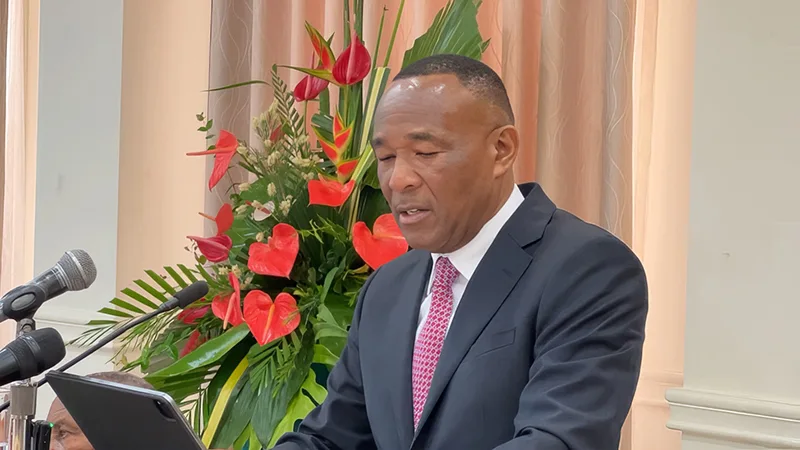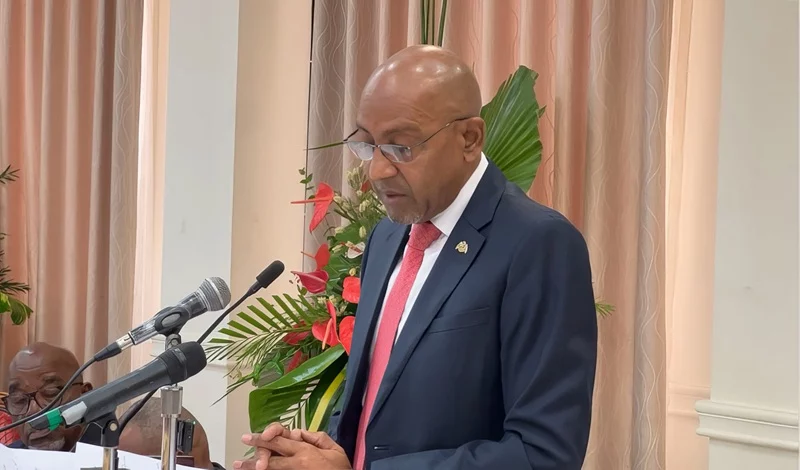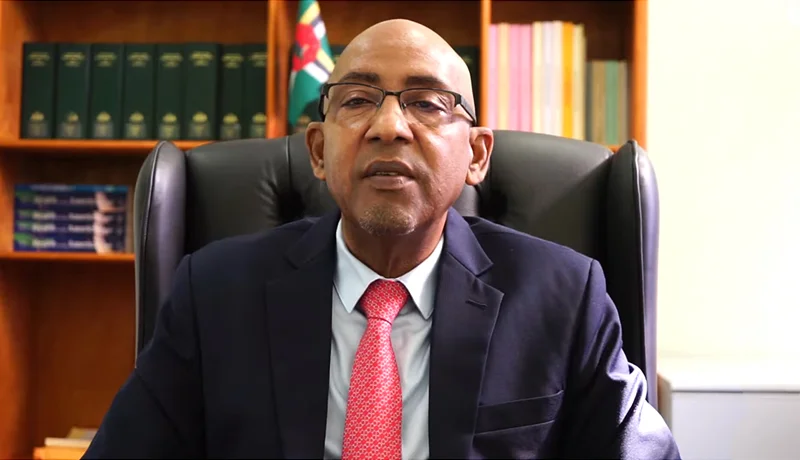
AID Bank AGM Highlights Economic Growth, Challenges, and Future Strategies
- AID Bank lends EC$71.2 million.
- Government supports bank with CBI funds.
- Small businesses struggle for loans.
- Unpaid loans hurt bank’s stability.
- Climate projects get more funding.
- Tighter loan rules to cut losses.
- Public demands clearer bank reports.
- Bank plans digital service growth.
The Dominica Agricultural Industrial and Development Bank (AID Bank) held its 31st Annual General Meeting (AGM) this week, offering a comprehensive review of its financial performance, economic impact, and future strategies. Key stakeholders, including Finance Minister Dr. Irving McIntyre and Ambassador Martin Charles, gathered in Roseau to assess the bank’s role in driving Dominica’s economic development. Discussions centered around government support, loan disbursements, delinquency challenges, and the bank’s commitment to climate resilience.
A Year of Growth Amidst Economic Challenges
According to the latest financial report, AID Bank injected EC$71.2 million into Dominica’s economy in the past year. These funds were allocated across agriculture, small businesses, education, housing, and renewable energy projects. The bank’s chairman, Ambassador Martin Charles, emphasised its role as a financial catalyst, ensuring that capital reaches critical sectors to stimulate economic growth.

Finance Minister Dr. Irving McIntyre reiterated the government’s commitment to strengthening the bank’s position. He noted that the government had channeled significant financial support into the institution, allowing it to continue financing priority sectors, despite global economic uncertainties.
The government has been instrumental in ensuring that AID Bank remains well-capitalized and fully operational. The strategic deployment of funds is essential for advancing national development objectives.
Finance Minister Dr. Irving McIntyre
However, while the bank recorded substantial financing activity, concerns were raised about the sustainability of concessional lending, particularly in the face of rising interest rates and global economic pressures.
Government Support and the Role of the CBI Programme
AID Bank has benefited from government support through the Citizenship by Investment (CBI) programme, a crucial revenue source for Dominica’s infrastructure projects and economic initiatives. The CBI programme has allowed the government to inject funds into the bank, supporting its lending activities for businesses, farmers, and first-time homeowners.
Prime Minister Roosevelt Skerrit has consistently defended the CBI programme as an essential financial tool, enabling investments in sectors that would otherwise struggle to secure adequate financing. However, concerns persist over the long-term viability of CBI-dependent funding, especially with increased international scrutiny of such programmes.
As international regulations tighten around economic citizenship, AID Bank will need to diversify its funding sources to maintain stability in its lending operations.
Small Businesses and Farmers: Access to Capital and Persistent Challenges
A significant highlight of the AGM was the impact of AID Bank financing on small businesses and agriculture. The bank has provided millions in low-interest loans to entrepreneurs, helping them expand operations and create employment opportunities. Additionally, the agricultural sector has received targeted financial support, ensuring food security and promoting exports.
The National Association of Youth in Agriculture (NAYA) was recognized for its role in mobilizing young farmers and advocating for better access to agricultural financing. The Minister of Agriculture praised AID Bank for providing concessional loans encouraging sustainable farming practices and climate resilience in food production.
Despite these initiatives, challenges remain. Many small business owners have expressed concerns over high collateral requirements and complex loan approval processes, making it difficult for startups and microenterprises to access credit. Some farmers also noted delays in disbursement and a need for greater flexibility in loan repayment terms.
One local entrepreneur, who received funding for an agribusiness venture, described the loan process as “a lifeline,” but urged AID Bank to simplify bureaucratic hurdles to enhance accessibility.
Loan Delinquencies and Non-Performing Assets
One of the more pressing issues discussed at the AGM was loan delinquency and non-performing assets. While AID Bank has significantly increased lending, it has also faced rising challenges in loan recovery, particularly from businesses that have struggled post-pandemic.
The bank’s executives acknowledged that delinquent loans have placed pressure on financial performance, requiring stricter enforcement measures to recover outstanding payments. Ambassador Martin Charles noted that enhanced credit risk assessment measures were being implemented to mitigate future loan defaults.
A sustainable financial institution cannot afford to have excessive delinquency rates. We are refining our loan approval and monitoring processes to ensure better compliance and repayment discipline.
Ambassador Martin Charles, Chairman of AID Bank
However, some critics argue that the bank has been too lenient in extending loans to politically connected individuals and businesses, raising concerns about transparency in fund allocation. Calls for greater oversight in loan approvals and a more rigorous collections strategy were echoed by some financial analysts.
AID Bank’s Commitment to Climate Resilience
A key focus of the meeting was AID Bank’s role in supporting Dominica’s transition to a climate-resilient economy. The bank has played a crucial role in funding renewable energy projects, sustainable agriculture, and resilient infrastructure. Investments in solar and geothermal energy, as well as projects aimed at fortifying buildings against hurricanes, have been prioritised in the bank’s lending strategy.
Dominica’s ambition to become the world’s first climate-resilient nation aligns with AID Bank’s approach to financing green energy projects. The bank has partnered with regional and international organisations, including the Caribbean Development Bank (CDB) and the World Bank, to secure funding for climate resilience initiatives.
As part of its long-term strategy, AID Bank has committed to increasing concessional lending for climate-smart projects, ensuring that businesses and homeowners can invest in sustainable solutions that mitigate climate risks.
The Future of Development Banking in Dominica
The AGM provided a platform for stakeholders to discuss the evolution of AID Bank and its future role in Dominica’s economic landscape. While the bank has made significant strides in financing national development, its long-term sustainability hinges on diversifying funding sources, improving loan recovery rates, and expanding accessibility to small businesses and farmers.
One of the proposed strategies involves leveraging digital banking solutions to streamline loan applications and improve loan management efficiency. Additionally, there were discussions on strengthening partnerships with international financial institutions to secure more concessional financing.
AID Bank remains a cornerstone of Dominica’s development agenda, but as the economy faces global uncertainties, the institution must adapt to emerging financial challenges while continuing to drive growth and resilience.
As the meeting concluded, stakeholders reaffirmed their commitment to ensuring AID Bank remains a vital financial engine for Dominica’s future. The focus now shifts to implementing the strategies discussed, with an emphasis on financial stability, accessibility, and sustainable development.
This article is copyright © 2025 DOM767








